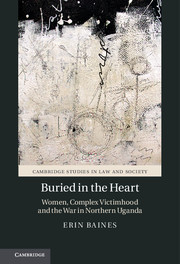5 - Seven Stories
Published online by Cambridge University Press: 05 January 2017
Summary
My heart beats.
– LamwakaIn seeking to recreate the history of the Partition of India (1947), Urvashi Butalia looks to the stories of women's agency through the violence and after it. Faced with the threat of rape or forced marriage, young women were killed by their families or jumped into deep wells to their deaths. Butalia reflects that “[s]tories of this kind of mass suicide, or of women being killed by their own families, are legion. How do we read these accounts? Are the women being spoken of here agents or victims? Can the act of mass death by jumping into wells be seen as a violent one or not? These are not easy questions to answer.” The final acts of those who perished, Butalia suggests, testify that, “the story of these women is by no means over.” Butalia reiterates her observation that such testimony cannot be found in the archive, or “in the facts and figures” available there. “There are so many complexities and different aspects here that we can perhaps only begin to explore the meanings that may lie there.”
In this chapter, I consider the possibilities of storytelling to think anew about victim agency in the face of mass violence, and efforts to renew life after it. In the first part, I consider four stories of women's agency in the face of dehumanizing violence inside the LRA. In each story, I attend to the ways in which women embody, enact and insist on the ethical dilemmas of living through coercive violence, including the ways violence folds into the intimate relationships that give and detract from a meaningful life and retaining one's sense of self and humanity. I also consider the ways in which violence and interpersonal relations are entangled, and I demonstrate the ways in which women reconstitute their sense of self and relations to others in “the very space of devastation.” Politics is relational. Power exists, as Arendt so aptly argues, “in the web of human relationships, with its innumerable, conflicting wills and intentions” and that, because of this, “action almost never achieves its purpose.”
- Type
- Chapter
- Information
- Buried in the HeartWomen, Complex Victimhood and the War in Northern Uganda, pp. 99 - 128Publisher: Cambridge University PressPrint publication year: 2016

